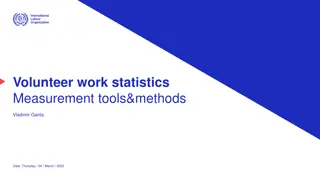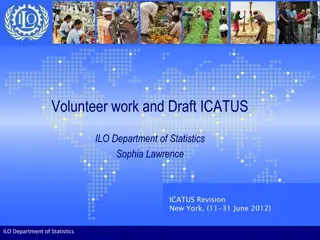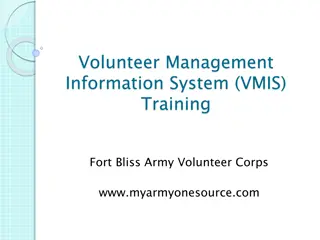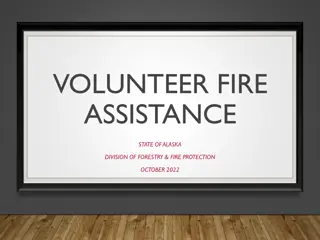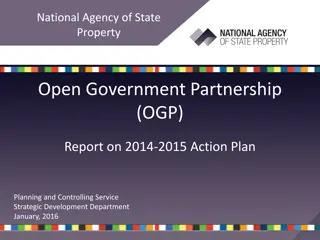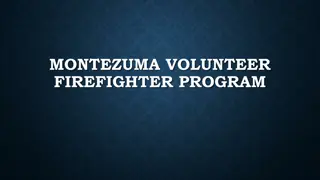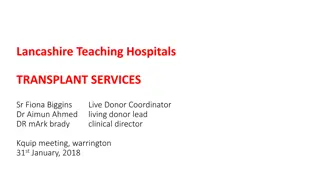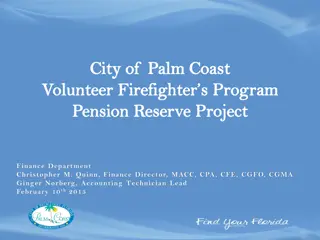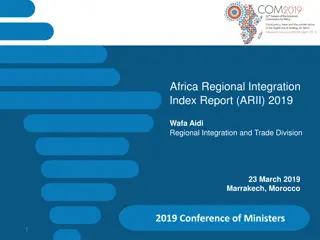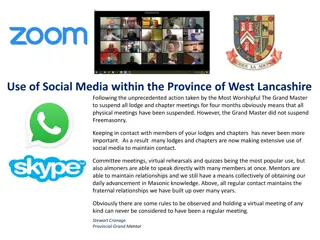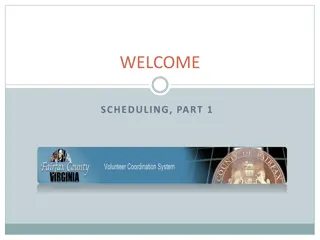Lancashire Public Services Volunteer Integration Initiative
Public services in Lancashire are leveraging volunteers to meet increasing demand, reduce vulnerability, and enhance resilience. The initiative aims to improve efficiency, save costs, and build a sustainable service model by integrating public service volunteering across various agencies and fostering a culture of community support.
Download Presentation

Please find below an Image/Link to download the presentation.
The content on the website is provided AS IS for your information and personal use only. It may not be sold, licensed, or shared on other websites without obtaining consent from the author.If you encounter any issues during the download, it is possible that the publisher has removed the file from their server.
You are allowed to download the files provided on this website for personal or commercial use, subject to the condition that they are used lawfully. All files are the property of their respective owners.
The content on the website is provided AS IS for your information and personal use only. It may not be sold, licensed, or shared on other websites without obtaining consent from the author.
E N D
Presentation Transcript
Background Whether brought about by socio-economic, political or budgetary factors, demand on public services around welfare and safety is increasing Public services need to identify how, in a period of austerity, they are going to meet and face this demand Community step down is a critical enabler in redefining the relationship between statutory services and communities In December 2015 Chief Officers, the OPCC and partner agencies agreed a vision for volunteering that sought to capitalise on the capacity public service volunteers could bring to reducing vulnerability
Vision That Lancashire Public Services have an Integrated, efficient, effective and high quality Public Service Volunteer offer that matches resource with need, supports vulnerable people to get the help they need to become stronger and more resilient whilst reducing the demand on statutory services.
Delivery Method April 2016 - The OPCC were awarded a Police Innovation Fund grant to bring this vision into reality With match funding this amounted to an investment of over 2M June 2016 - A Programme Plan was approved for the delivery of the Lancashire Volunteer Partnership The Partnership seeks to deliver benefits by integrating public service volunteering For the Constabulary this includes Specials, Volunteer Police Cadets, Volunteers and Neighbourhood Watch etc.
Benefits More efficient business support function Efficiency savings in reduced statutory intervention Increased capacity to reduce vulnerability and demand on statutory services More sustainable model for future service delivery Implementation of good practice across all Lancashire public services County resource available for civil contingencies and major emergencies
Multi-Agency Strategy Integrated Leadership and Commissioning Integrated Teams and Workforce Development Integrated Data Sharing and ICT Systems Develop Community Resilience Cultural Shift Shared Outcomes and Evaluation
Key Deliverables This affects all Lancashire Constabulary Volunteers from Specials, Cadets, Road Watch, NHW, Watch Schemes and Community Support Volunteers etc. Rationalise multi-agency processes creating one single gateway into public service volunteering across Lancashire Create a single business support function that delivers consistency and efficiencies Develop an agile workforce that can meet the needs and demand of services Integrate a single ICT system that facilitates the matching of public service volunteers to need
Key Deliverables Increase the capacity of public service volunteers to meet increasing need through additionality and widening the volunteer skill base Offer a service that is universal and prioritises those in most need regardless of age or other characteristics Broaden the diversity of volunteers so that they better reflect local communities Inform and guide the commissioning of the voluntary sector by identifying gaps in service provision Increase confidence and public value by demonstrating how public services can work together to deliver relevant, effective and integrated services
Ambition for Growth Ambition for 350 extra cadets, making 1,000 Additional 200 Specials Ambition for 300 Community Support Volunteers Ambition for a greater more dynamic and independent NHW Civil emergency cover
Alignment A process began to test current Constabulary structures and roles to see if they could align with the; Vision for volunteering Lancashire Volunteer Partnership Transformational Model Ambition for growth
Research / Analysis & Consultation National and Regional events and conferences National Leads NHW / Specials / Cadets etc. Chief Police Officers / Lancashire and National CIP portfolio holders Directors of Public Service Fire Service (Safe and Well visits) Educational establishments Practitioners Volunteers Unison Lancashire Special Chief Officers Legal / Vetting Finance and HR
Research / Analysis & Consultation Number of volunteers recruited / Ambition for future Number of Specials / Ambition for future PR and recruitment events Opportunities for future Management reports from Better Impact future reward and recognition opportunities and outcome monitoring Staff surveys and one to ones with staff Cost benefit and social return on investment Weekend and evening work / Mileage and expenses In the Know sign ups and engagement Scoping future developments both nationally and locally Academic research and evaluation papers Sources of public service demand Developing trends in policing demand
Findings Roles do not offer the flexibility for work towards achieving the volunteer vision Working practices have developed that are not in keeping with the role grade or what service users want New ICT provision has provided opportunity for tasks that reduce vulnerability but such tasks fall outside role descriptions Many tasks performed in these roles are a duplication of tasks being performed by other roles Many tasks do not align with the Constabulary's mission and do not prioritise the vulnerable
Findings Fragmented Line management has caused a lack of consistency which impedes a partnership approach and integration There is a need to increase capacity if ambitions around Special Constables, Volunteer Police Cadets, Volunteers and NHW are to be realised HQ CIP Sergeants role is not budgeted which could undermine the future sustainability of the Partnership Working practices impede the need for greater outreach support Role descriptions do not include holding a caseload of volunteers with the aim of reducing vulnerability
Proposal for Change This is a invest to save proposal and both the Chief Officer team and the OPCC have been involved in the consultation Will require changes in tasks performed but will better realise the Vision for Volunteering, deliver the Police and Crime Plan, meet the ambition for growth OPCC and Chief officers want to invest in order to reduce vulnerability and demand on statutory services These Proposals will better support placed based Leadership teams and provide the management information required to direct change
Proposal For Change 1. It is Proposed the HQ CIP Sergeant changes to become LVP Supervisor (To be offset by cost savings made by recommendation 4 and to review potential to become Police Staff role in Yr. 4 2020) 2. It is Proposed that an additional supervisory role is introduced Police Staff LVP Supervisor (Funded by the OPCC) LC7 3. It is proposed PCSO / Cadets to increase by 3 creating 7 posts in total (This move is cost neutral to the Constabulary)
Proposal for change 4. It is proposed to disestablish; 6 x Special / Volunteer Co-ordinator LC5-6 6 x Watch Liaison Officer LC-5 2 x CIP and Quality of Service Officer HQ LC 5 6 5. It is proposed to establish; 7 x LVP Neighbourhood Volunteer Support Assistants LC3/4 8 x LVP Neighbourhood Volunteer Officers (Outreach and Outreach Support) LC5/6
Finance Proposal OPCC have agreed to fund an LC7 Supervisor and 20k additional expenses for outreach work on a recurring basis With savings identified in proposal 4 to offset it, the Constabulary to find an additional 22k on a recurring basis to fund the existing supervisor role. This has been identified in savings already made and is included in the Medium Term Financial Forecast PIF funding to pay for all growth in 2017/2018. Recurring funding from the OPCC and Constabulary will not be required until 2018 / 2019
Restructure process If approved the formal restructure process would commence in January 2017 This will be conducted in accordance with the Management of Change Policy Will include a formal consultation period during which those affected will have an opportunity for a one to one to discuss regarding individual circumstances It is proposed the new model would be in place from May 2017







